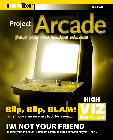Project Arcade
Errata
Chapter 14, Page 345
Bottom paragraph is missing the last 8
lines. Corrected version is below.
To be fair to the manufacturers, piracy
is a big problem in this and many other countries. How much revenue is
lost depends on who you ask, but there is no doubt that there is a
significant amount of illegally copied material floating around out
there. Some manufacturers came up with techniques to prevent copying of
their software, methods that made copies useless. Techniques and
products were then developed that circumvented those copy protection
schemes. New copy protection schemes were then invented. This went on
back and forth for many years. Then a law was passed called the DMCA,
the Digital Millennium Copyright Act, that made it illegal to
circumvent copy protection schemes built into digital material. This
had a significant possible impact on emulators. Many arcade game ROMs
were encrypted (a form of copy protection) to prevent unscrupulous
manufacturers from making bootleg copies of their arcade games. For
instance, a bootleg version of Donkey Kong (which did not have
encrypted ROMs) was created called Crazy Kong. Bootleg copies of arcade
games became a serious problem in the arcade industry until encryption
was used. The problem this made for emulators was that to run encrypted
games, the programmers had to break the encryption used in those games!
Breaking encryption is a method of circumventing copy protection, which
now appeared to be against the law! After some time had passed and some
amount of public outcry, the restrictions enacted by the DMCA were
relaxed as they pertained to video games that had become obsolete (for
more information, go to www.copyright.gov/1201/). These relaxed
interpretations of the DMCA appear to allow the techniques used in
emulators because the video games appear to fit the definition of
obsolete as described in the previous reference. The exact impact upon
the emulation community is not precisely known, but it is clear that
this is an area of copyright law that is in flux and will be subject to
analysis and change for some time to come.

Book material
Copyright © 2004 Wiley Publishing, Inc.
Copyright © 2004 by shed simultaneously in Canada
No part
of this publication may be reproduced, stored in a retrieval system, or
transmitted in any form or by any means, electronic, mechanical,
photocopying,
recording, scanning, or otherwise, except as permitted under Section
107 or 108
of the 1976 United States Copyright Act, without either the prior
written
permission of the Publisher, or authorization through payment of the
appropriate per-copy fee to the Copyright Clearance Center, Inc., 222
Rosewood
Drive, Danvers, MA 01923, (978) 750-8400, fax (978) 646-8700. Requests
to the
Publisher for permission should be addressed to the Legal Department,
Wiley
Publishing, Inc., 10475 Crosspoint Blvd., Indianapolis, IN 46256, (317)
572-3447, fax (317) 572-4447, E-mail: permcoordinator@wiley.com.
Website and all other material
Copyright © 2004
John St.Clair
No part of this Web site may be reproduced without prior written
permission of John St.Clair
-Home-
|

